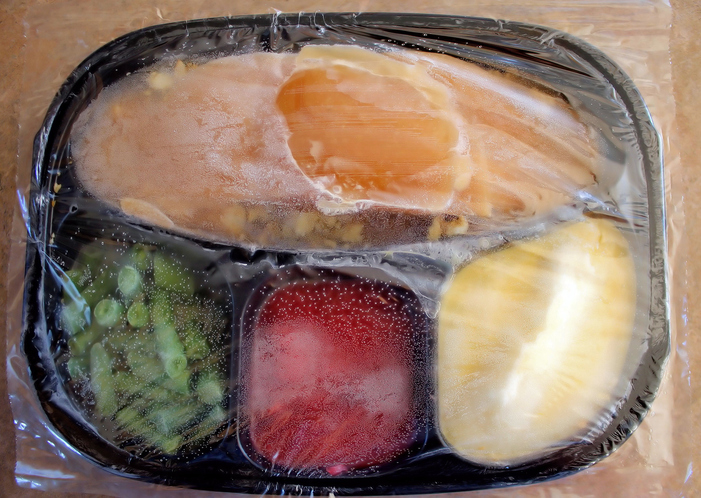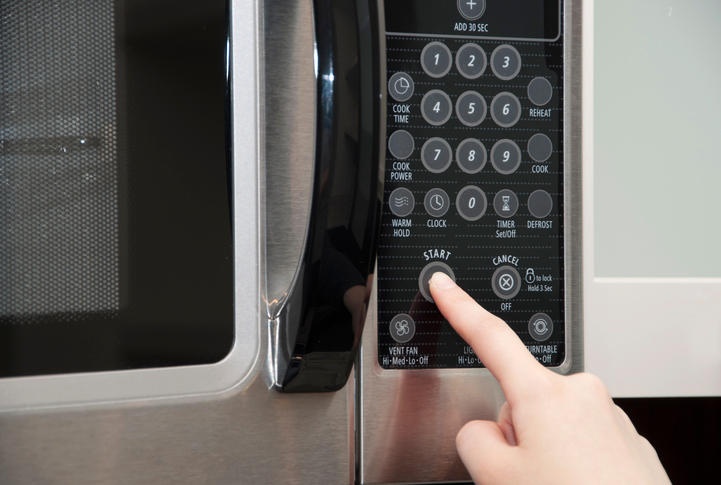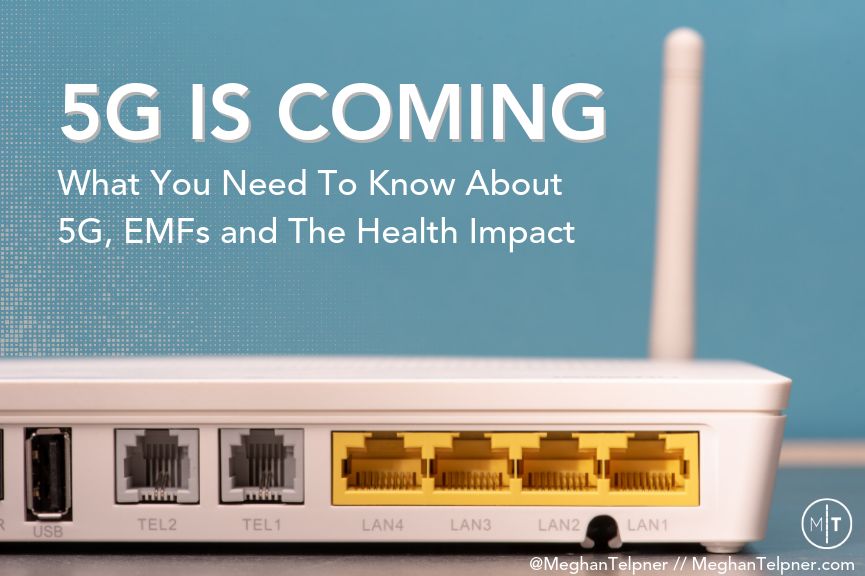Is Your Microwave Harming Your Health?

I have lived microwave-free for well over a decade. It’s the way I roll both at home and in my kitchen work space. And guess what? We survive! We use the oven to heat up something large and a pan and stove for smaller things. Yes, even at work. It’s lunchtime and we all grab a pot or a pan and heat up our lunch. It’s absolutely easy and totally doable. And worth it, especially when there is a wealth of evidence that shows how the microwave is harming your health.
The microwave is has always been a bit of a controversial appliance. Any benefits of convenience certainly don’t outweigh the potential negative risks. I always aim to live in a way that supports my optimal health and wellness, so whether it’s GMOs, additives in our children’s food, toxins in beauty care or hazardous cleaning products, I eliminate any harmful or untested ingredients, equipment or products from my home. When in doubt, I get it out, because it is possible that your microwave is harming your health.
Is your microwave harming your health: the Health Effects of Microwave Cooking
Microwaves and Plastics
If you’ve been reading this blog for a while now, you’ll know I’m not a fan of plastics. Plastic products disrupt our endocrine system and damage the environment. Many of us are accustomed to taking leftovers for lunch in lightweight plastic containers, which we stick into the microwave to reheat, or buy pre-packaged microwaveable meals that we microwave, eat and then toss the packaging (and most of that plastic can’t even be recycled).
Microwaving in plastic containers is extremely damaging to our health. A number of plastics contain BPA, a known endocrine disruptor, and the replacement chemicals companies are using to make BPA-free plastics are turning out to be equally, and in some case, more harmful.
Consider the following about microwaving your food in plastic:
- It transfers phthalates into your food (you can read more about the danger of phthalates here)
- It leaches chemicals from BPA-free plastics into your food
- It releases chemicals into your food that disrupt your endocrine system
- BPA-free plastics are often used in baby products – so heating up breast milk or formula can potentially disrupt your baby’s endocrine system
- Disturbingly, microwaving in BPA-free plastics can sometimes release more estrogenic chemicals than those with BPA.
Have some old dishes of your Grandma’s kicking around? Turns out, the glazes in older ceramic dinnerware contain unsafe amounts of lead, so microwaving your food in certain ceramics could mean you’re ingesting dangerous quantities of lead.
Microwaves and Food Packaging
A number of pre-prepared, processed and single-use microwaveable packages can be harmful to our health as well.
One study of common microwaveable products found at the grocery store identified 44 volatile organic compounds (VOCs) in the packages. VOCs are a suspected carcinogen and can cause headaches, nausea, and skin/eye/throat irritation.
And if you’re a fan of microwave popcorn, consider that studies show the popcorn bags contain vapors of perfluorooctanoic acid (PFOA), a chemical used to make Teflon cookware. Microwave popcorn also emits VOCs – and the greatest amount of them (80%) are released when you open up the bag after it’s done popping. It’s like having a steam facial of chemicals.
Microwaves and Nutrient Loss
Microwaves impact the nutrient value of our food. There are tons of examples of this.
Microwave cooking has been shown to:
- Reduces garlic’s anti-cancer properties
- Lowers the lutein content of spinach
- Decreases Vitamin C and cancer-fighting glucosinolates in cruciferous veggies
- Reduces the amount of glucosinolates in cabbage (steaming did not have this effect)
- Decreases Vitamin B12 by 30-40%
- Increases the lipid (fat) oxidation of chicken and beef patties
- Boosts the lipid oxidation of pork
- Increases heterocyclic amines, which are linked to cancer
Do all cooking methods affect nutrients to some degree? Sure. However, with other cooking methods (steaming, slow cooking, dehydrating, baking, etc.) we are more able to control the temperature as well as the length of time we cook our food.
Aside from nutrient loss, I personally believe that other cooking methods bring out better flavours in our food as well. With microwave cooking, you’re basically just zapping your food. Braising, steaming, roasting, slow cooking and other cooking methods allow flavours to meld and develop in a way you just won’t get from five minutes of microwave cooking.
Microwaves and Radiation

Microwave ovens and radiation is a controversial topic with plenty of debate on either side. I am very concerned about the way technology is increasingly encroaching on our personal health. There are many ways we can reduce our risks and eliminating the microwave is an easy one.
Consider some of the following research on microwaves and radiation:
- Microwave radiation can have a measurable effect on brain energy metabolism
- Microwaving human breast milk decreases its nutrients, including its immune activity
- Regulators claim that a proper functioning microwave won’t leak radiation. However, damaged or dirty microwaves can impact the seal (when was the last time you cleaned the gunk in your microwave?) so you may not realize you’re being affected.
Given the multitude of healthier and tastier cooking options, the microwave is one appliance we can all do without.
Healthy Cooking Methods
If you’ve decided to ditch the microwave, what can you use instead? Here are some of the cooking methods I use regularly in my kitchen.
- Steaming
- Dehydrating
- Slow cooking (I have a great stainless steel slow cooker base you can you with your existing pots and dishes)
- Roasting (up to 400 degrees, but I usually use the oven at around 350)
- Stovetop cooking (usually over low to medium heat)
How to Reheat Your Food Without the Microwave
Want to heat up leftovers? Skip the microwave and do one of these instead:
- If your leftovers are liquid, like a soup/stew, throw it in a pot on the stovetop. I will even do this for things like pasta or stir-fries and add a bit of extra water or sauce to keep it from drying out.
- Put it in the oven or toaster oven to reheat.
- If you’re on the go, purchase a good thermos to keep your food warm.
- To defrost a meal from the freezer, take it out the night before and leave it in your fridge to defrost. If you’re short on time, stick mason jars with soups, stews, beans and grains and let them sit in hot (not boiling) water to defrost.
Microwaves are large appliances that take up valuable space in the kitchen, are potentially hazardous to our health and really serve on purpose which can easily be done on the stove. So why not ditch the microwave harming your health and in its place store your dehydrator, juicer, slow cooker or speakers so you can dance in the kitchen.
Free Resource Library
Enjoy more than 40 downloadable guides, recipes, and resources.
























Right there with you! I would love to get rid of our microwave, but my husband and kids think I’m crazy. I don’t even like anything to be near the microwave when it’s in use, especially my body! I guess it will take time to convince them. I’m definitely going to show them this post. Oh and what I would give to have that counter space back in my ever so small kitchen!
Thanks for the info!!
The boyfriend and I stopped using a microwave years ago because it broke and we refused to get it fixed. I’m so glad that we didn’t get it fixed because we’re now accustomed to using the oven to heat our foods. As, I’m learning more about the effects of toxins and microwaving it has been a nice way to learn to live without it! Currently, we are slowly phasing out plastics and thanks to your Health at Home class, ridding our house of chemical ingredients.
Hi Meghan,
thanks so much for this blog. I am so glad that someone is finally talking about this.
I am worried about us using the microwave to make popcorn – this is something that I will quit doing today.
Also… the use of plastics in general – be it wrapping material for stuff we purchase or plastic grocery bags or even produce bags… it adds up. We all need to change our ways for our own sake…
Keep up the good work!!
sending you lots of sunshine from Canada!
:-)
I would love for you to share the healthy pots, pans, and tools you use in your kitchen.
Hi! My husband and I are digital nomads and have been living and traveling in our tiny trailer for about 18 months. I opted not to have a microwave because of the wasted space and haven’t missed it once. One more reheating method that works really well is to use your steamer insert. I use it to reheat things like leftover fish, chicken, steak and baked potatoes. It’s really great for the meats, because then they don’t dry our.
The microwave research you posted is not relevant to microwave ovens. Microwave ovens use a specific frequency to “excite” water molecules and the microwaves remain in the oven. Humans composed of are around 60% water; imagine what would happen if the microwaves could escape the oven. I think the problem with microwaves is that most people “zap” everything on a maximum instead of using the temperature control settings to best effect.